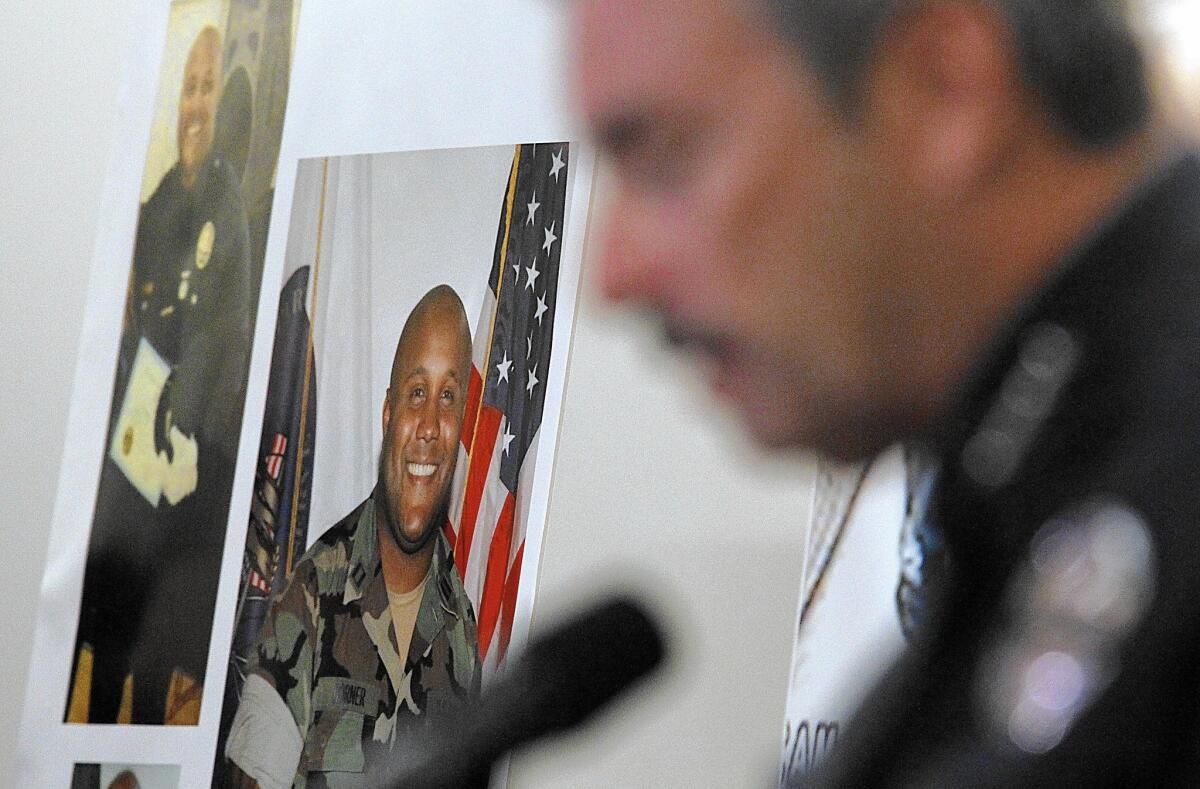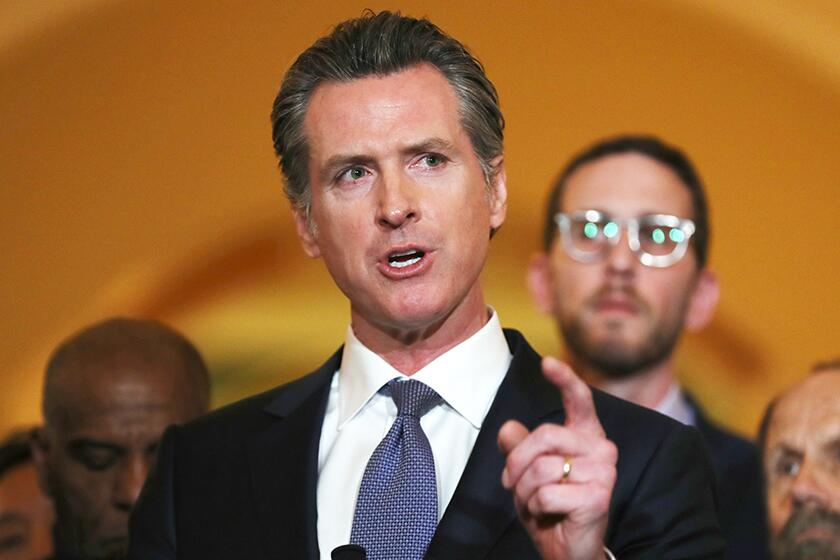LAPD survey in wake of Dorner rampage finds bias complaints

- Share via
A Los Angeles Police Department review of its discipline system prompted by the Christopher Dorner rampage found widespread concerns among officers and civilians that the agency discriminates based on gender, ethnicity and rank, according to a report reviewed by The Times.
Focus group sessions held with more than 500 department employees found that many of those interviewed believed internal investigations were unfair and that punishments were subjective, the document said. Among the complaints were that the department overlooks misconduct by high-ranking officials, that discipline is influenced by public and media pressures and that nepotism infects the disciplinary process.
The report, however, also contained data that raised doubts about some of those perceptions of bias. Statistics compiled by the LAPD show that the ethnic, gender and rank breakdown of officers sent to disciplinary panels for suspensions or termination roughly matches the demographics of the LAPD as a whole. White officers, for example, make up 36% of the department and 35% of officers sent to a Board of Rights disciplinary hearing for a lengthy suspension or termination. Black officers account for 12% of officers and 14% of those sent to such hearings.
LAPD Chief Charlie Beck ordered the report more than 20 months ago after Dorner, an ex-LAPD officer, went on a shooting rampage across Southern California, killing police officers as well as the daughter of an LAPD captain and her boyfriend. In a rambling online document, Dorner claimed that he was seeking retribution after being unfairly fired and was the victim of racial discrimination within the department.
The civilian Police Commission is expected to review the report at a meeting next week.
LAPD officials said in the report that they were planning to make a significant change: returning to using specific guidelines to determine what punishment an officer deserves. The move is intended to help ensure similar punishments are handed out for similar types of misconduct.
The president of the Los Angeles Police Protective League, the union that represents rank-and-file officers, declined to comment, saying he hadn’t read the report.
Though Dorner was roundly condemned for his deadly February 2013 rampage, his allegations about discipline in the LAPD tapped into a deep well of discontent among many LAPD officers who had grown increasingly unhappy with how punishments were meted out under Beck.
Weeks after Dorner died during a siege at a mountain cabin, where he was holed up, officers continued to complain that discipline in the LAPD was uneven and unfair. In an attempt to quell the unrest, Beck said he would conduct a comprehensive review of how misconduct is investigated and how discipline is decided.
It was an issue that had dogged Beck in recent years. The chief had clashed repeatedly with members of the commission that oversees the department over what they saw as Beck’s tendency to impose lenient punishments on officers guilty of serious misconduct.
Beck gave no timeline for when the report would be finished, but members of the commission, officers and observers of the LAPD expected it to come far more quickly. Department officials have offered different explanations for the delay, saying that the retirement of a key aide who was overseeing the report led to lost time and, with the unwieldy nature of the survey, that it took time to sort through the officers’ comments.
As top department officials worked in secret to finish the report, questions about Beck’s handling of discipline grew. Officers’ anger reached a peak in March, when The Times reported on the case of police Officer Shaun Hillmann, who was the son and nephew of retired LAPD officers Beck knew. After Hillmann was recorded outside a bar uttering a racial slur and then lied about it to investigators, Beck overruled recommendations to fire the young officer and, instead, gave him a lengthy suspension.
The decision led to an outcry of favoritism and reinforced beliefs among officers that discipline is not handled impartially.
Also, in recent months, three LAPD captains have filed lawsuits against Beck and the department, alleging that they suffered retaliation from senior police officials after they opted not to fire officers who had been sent before discipline hearing boards. While the three-member boards are expected to reach independent decisions on what punishment an officer deserves, Beck has been clear since taking over as chief that, in most cases, if he sends an officer before a hearing board it is because he believes the officer is guilty of serious misconduct and should be fired. In their lawsuits, the captains said they felt pressured to fire the officers as Beck wanted and were taken to task when they refused to do so.
The Times reviewed documents containing hundreds of pages of unedited comments officers and civilian employees typed during the group discussion sessions that were used to conduct the survey. Officers repeatedly complained that the discipline system was unfair and expressed disdain for higher-ranking officials who they believe have grown out of touch with the challenges and realities of being a beat cop.
When asked whether disparities in treatment were based on race, gender, rank or nepotism, officers overwhelmingly said they believed decisions about discipline revolved around an officer’s rank and whether he or she was well liked by their superiors in the department. Command-level officers routinely received slaps on the wrist or no punishment, while lower-ranking officers were suspended for similar misconduct, officers wrote.
“The punishment should be the same regardless of rank,” one officer wrote in a typical comment. “It seems that people with more time on [the job] get more of a break.”
Many officers called on department leaders to return to using punishment guidelines that set ranges for how various misconduct should be disciplined. The department abandoned the guidelines several years ago in favor of a model that emphasized the uniqueness of each officer’s case.
Underlying many of the comments was a seemingly deep-seated sense of alienation felt toward the higher ranks. Some questioned whether the department officials were serious about listening to their concerns.
“The perception is that we have these types of meetings and nothing changes. Just going through the motions,” said one.
More to Read
Sign up for Essential California
The most important California stories and recommendations in your inbox every morning.
You may occasionally receive promotional content from the Los Angeles Times.












